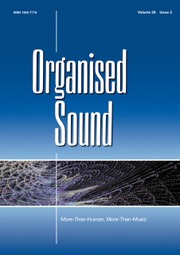Crossref Citations
This article has been cited by the following publications. This list is generated based on data provided by
Crossref.
Luciani, A.
Florens, J.
and
Castagne, N.
2005.
From Action to Sound: A Challenging Perspective for Haptics.
p.
592.
Havryliv, Mark
Geiger, Florian
Guertler, Matthias
Naghdy, Fazel
and
Schiemer, Greg
2009.
Haptic and Audio Interaction Design.
Vol. 5763,
Issue. ,
p.
91.
Luciani, Annie
Florens, Jean-Loup
Couroussé, Damien
and
Castet, Julien
2009.
Ergotic Sounds: A New Way to Improve Playability, Believability and Presence of Virtual Musical Instruments.
Journal of New Music Research,
Vol. 38,
Issue. 3,
p.
309.
Schoonderwaldt, E.
and
Demoucron, M.
2009.
Extraction of bowing parameters from violin performance combining motion capture and sensors.
The Journal of the Acoustical Society of America,
Vol. 126,
Issue. 5,
p.
2695.
Havryliv, Mark
Naghdy, Fazel
Schiemer, Greg
and
Hurd, Timothy
2010.
Cultural Computing.
Vol. 333,
Issue. ,
p.
75.
Sogin, David W.
2012.
Musicians’ Preferences for Different Variants of Bow Skew in a Violin Performance.
String Research Journal,
Vol. 3,
Issue. 1,
p.
41.
Havryliv, Mark
Naghdy, Fazel
and
Schiemer, Greg
2012.
Implementation of a haptic musical instrument using multi-signal fusion for force sensing without additional force sensors.
p.
3949.
Havryliv, Mark
Naghdy, Fazel
Schiemer, Greg
and
Hurd, Timothy
2013.
Haptic Carillon: A computationally enhanced mechanical performing instrument.
Entertainment Computing,
Vol. 4,
Issue. 3,
p.
221.
Sogin, David
2013.
Forum: String Pedagogy for the 21st Century: Catching up with Research.
String Research Journal,
Vol. 4,
Issue. 1,
p.
5.
Wollman, Indiana
Fritz, Claudia
Poitevineau, Jacques
McAdams, Stephen
and
Weng, Xuchu
2014.
Investigating the Role of Auditory and Tactile Modalities in Violin Quality Evaluation.
PLoS ONE,
Vol. 9,
Issue. 12,
p.
e112552.
Worrall, David
2014.
Can Micro-Gestural Inflections Be Used to Improve the Soniculatory Effectiveness of Parameter Mapping Sonifications?.
Organised Sound,
Vol. 19,
Issue. 1,
p.
52.
Leonard, James
Villeneuve, Jérôme
and
Kontogeorgakopoulos, Alexandros
2020.
Multisensory instrumental dynamics as an emergent paradigm for digital musical creation.
Journal on Multimodal User Interfaces,
Vol. 14,
Issue. 3,
p.
235.
Kontogeorgakopoulos, Alexandros
2023.
Music, Art Installations and Haptic Technology.
Arts,
Vol. 12,
Issue. 4,
p.
142.
Jung, Kyungeun
Kim, Sangpil
Oh, Seungjae
and
Yoon, Sang Ho
2024.
HapMotion: motion-to-tactile framework with wearable haptic devices for immersive VR performance experience.
Virtual Reality,
Vol. 28,
Issue. 1,


